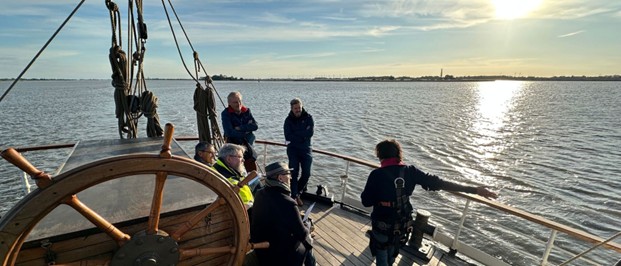When a change of course still leads to the goal
November 2025 PM Update from Germany
REPORT
By Sebastian Wieschowski
Nuremberg, Germany

Introduction
Elsfleth’s harbor was straight out of a postcard: Gulls screeched overhead above the Weser River, while the autumn-colored trees reflected in the calm water. Between the brick facades of the harbor buildings in the remote village in Northeastern Germany, the Großherzogin Elisabeth (English: ”Grandduchess Elizabeth“) lay ready to set sail—a majestic training ship whose towering masts reached high above the harbor, evoking a sense of adventure the moment you stepped aboard.
- MARITIME TRADITION AS A STARTING POINT
Around 50 project management professionals from across Germany gathered in September 2025 at the invitation of the GPM Regional Group Bremen/Oldenburg to explore the parallels between seafaring and successful project management. The Bremen–Oldenburg region has been shaped for centuries by its close connection to the sea. Port industries, shipbuilding, and maritime services are not only economic pillars but also part of the region’s identity.
The GPM Regional Group Bremen/Oldenburg intentionally built on this heritage. “We wanted to bring the topic of project management closer to people who may not have direct exposure to it, while also offering our members something special,” explained Irmtraud Behrens, member of the regional leadership team.
This approach deliberately addressed multiple stakeholder groups—a key element of sound project management. External participants were given an accessible introduction to the field, GPM members benefited from exclusive networking opportunities, and the Bremen/Oldenburg region served as the backdrop for an event that honored its maritime roots. This conscious inclusion of diverse perspectives exemplifies the principle of stakeholder management, an approach essential to project success.
- THE SAILING SHIP AS A SYMBOL FOR PROJECTS
Few domains demonstrate the importance of precise project management as clearly as maritime operations. First, new ship constructions and modernizations demand close coordination between shipyards, suppliers, and classification societies. Strict adherence to timelines and budgets is crucial to avoid multimillion-euro delays. Second, logistics in ports are inherently project-oriented—arrival and departure, cargo securing, and customs procedures must be meticulously synchronized for smooth operations. Third, safety at sea also depends on project management, whether in route planning, emergency drills, or cooperation among international crews working in confined spaces where clear roles and processes are essential.
More…
To read entire report, click here
How to cite this paper: Wieschowski, S. (2025). Project management under sail: When a change of course still leads to the goal, report; PM World Journal, Vol. XIV, Issue XI, November. Available online at: https://pmworldlibrary.net/wp-content/uploads/2025/11/pmwj158-Nov2025-Wieschowski-project-management-under-sail-report.pdf
About the Author

Sebastian Wieschowski
Nuremberg, Germany
![]()
Sebastian Wieschowski is an editor at the German Project Management Association (GPM), the national member association of the International Project Management Association (IPMA) in Germany. He is responsible for developing GPM’s media relations and serves on the editorial board of PM Aktuell, a quarterly magazine distributed to more than 6,500 GPM members as well as external stakeholders.
Born in 1985 in northern Germany, Wieschowski developed an early fascination with journalism. His formal education began with active contributions to school and local newspapers. He later completed journalistic training at the Cologne Journalism School for Politics and Economics, earned a Master Level Diploma from the School of Journalism at Eichstaett University, and undertook professional training at a regional newspaper publisher. He also holds a postgraduate M.Sc. degree in Public Health from Hannover Medical School.
In addition to his freelance journalism for national and international outlets, including major German media such as DIE ZEIT, Wieschowski has held senior communications roles since 2012. He first worked as press officer for a private university specializing in social work, then for a psychiatric hospital, and later for an industrial company. In September 2024, he joined GPM’s Marketing and Public Relations department, where he focuses on strengthening the visibility and public relevance of project management through editorial formats such as storytelling.
Alongside his professional career, Sebastian Wieschowski is also active as a freelance author in his lifelong passion, numismatics. He writes for both German- and English-language specialist publications, and his work has been recognized three times by the Numismatic Literary Guild, a writers’ association based in the USA.
Sebastian is a reporter at heart and enjoys discovering inspiring stories and meet people from around the world, a goal that is particularly easy to pursue in the field of project management. He can be contacted at s.wieschowski@gpm-ipma.de.









